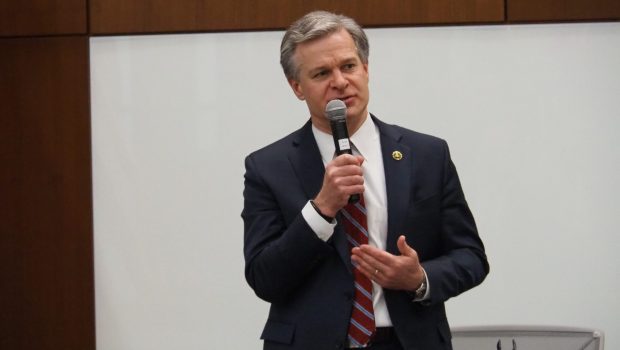FBI director aims at broadening cybersecurity abilities of local, state, federal agencies
TOPEKA — FBI Director Christopher Wray said during a cybersecurity recruiting visit to Kansas on Friday the computer investigative capacity of local, state and federal law enforcement officers must be expanded to tackle rise in internet crime across the country.
The federal agency’s director was in Lawrence with U.S. Sen. Jerry Moran of Kansas to talk about the shortage of cybercrime investigators and to meet in Topeka with law enforcement officers about their ideas for advancing their work and for improving cooperation between the FBI and city, county and state officers in Kansas.
“We’re not going to be able to recruit our way out of this problem because even the private sector can’t recruit enough people that have really high-end type of talent,” Wray said.
He said the FBI would continue to attract quality employees, but needed to identify and redirect personnel with the aptitude to excel at cybercrime investigation.
He said more local and state law enforcement officers should engage with FBI task forces on cybercrime to help widen the general proficiency within the profession. In addition, the director said, victims of cybercrimes should contact the FBI’s hotline to help the agency pull together treads of criminal enterprises with a wide geographic reach.
The Kansas Bureau of Investigation has taken initial steps to stand up a cyber workforce and separately the Kansas Law Enforcement Training Center is collaborating with the University of Kansas to deepen instruction in skills necessary to catch electronic criminals.
KBI Director Kirk Thompson said the Legislature recently provided funding to launch the operation, but more resources would be needed as the operational tempo increased.
“We’re still taking baby steps,” Thompson said. “It’s been a slow rollout.”
Wray and Moran met with several dozen law enforcement leaders from Kansas for about an hour in the KBI’s laboratory at Washburn University. The Kansas officials raised questions about access to federal grants, which at times were tied to geographic boundaries or offense-specific work that didn’t make practical sense. Moran said he would work on fine-tuning the grant process to increase the odds of smaller, rural departments gaining funding.
Wray said the FBI was engaged in threats from abroad that often gained attention, but bulk of the agency’s resources were still funneled into criminal cases.
“Whether it’s Ukraine, whether it’s terrorism, whether it’s a China threat or a cyber threat, you hear about a lot of things we do from a national security perspective,” Wray said. “I don’t want you to ever think that we’ve taken an eye off the ball from the traditional criminal threats, which are still our bread and butter.”
Wray said the rise in violent crime, especially homicide rates, in Kansas was also experienced across the United States. Last year, he said, was the most deadly in decades in term of law enforcement officers killed in adversarial situations, figures that exclude COVID-19 and traffic accidents. There are ramifications for deputies and officers working in stressful environments while dealing with horrific criminal behavior, he said.
“Mental health is a huge issue in our profession right now. Suicides in law enforcement are up,” Wray said.
Sedgwick County Sheriff Jeff Easter said the department’s challenge with mental health outstripped a program designed to rely on peer support. Hiring counselors to work with members of the department requires resources that the FBI or Congress could provide, he said.
“If we’re not healthy in the mind and body, we’re not going to be helpful to people,” Easter said.








Gloss